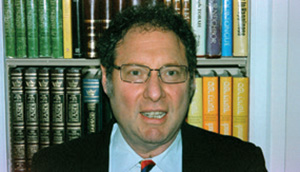
Two of the great leaders of the chasidic movement were the Baal Shem Tov and Rabbi Menachem Mendel Morgenstern of Kotzk, known as the Kotzker Rebbe.
These two leaders could not be more different. The first, Rabbi Israel Baal Shem Tov, taught the love of God for every man, to love every Jew, joyous celebration with God’s closeness, the goodness of man and of God’s world. The second, the Kotzker Rebbe, emphasized the contempt of human failings, his pursuit of pride, self importance, selfish egotism and desire for honor.
The Baal Shem Tov helped develop a new understanding of Judaism, called chasidism. He revealed the presence of God as even in our shabby world, in every little thing, and especially in every man. Every man in this world could work deeds that might affect the worlds above. Most important, attachment to God was possible, even while carrying out mundane and ordinary tasks. God was not only in the yeshiva where Torah scholars studied, but He was with every man, no matter how unlearned. Hasidism democratized Jewish life in the sense that God was accessible to everyone. Every Jew could celebrate God’s presence with joy. Chasidism argued that depth of religious feeling was far more significant than intellectual mastery of texts. Therefore, the Jewish lower classes, poor and uneducated in Talmud could by virtue of their piety attain religious greatness.
Many great chasidic leaders followed in the footsteps and teachings of the Baal Shem Tov. Only one chasidic rebbe challenged his teachings: Menachem Mendel of Kotzk. While the Baal Shem Tov emphasized love, joy and compassion in this world, Kotzk demanded a vigorous, complete introspection, a war against the ego. If there is a single term that most fundamentally describes the basic Kotzk approach, it is the concept of truth, emet. Truth with himself and others. Truth, not happiness, not joy, not love. One must do away with habit, with outward appearances. He despised appearance, the making of impressions, seeing in it an expression of selfishness and a desire to deceive others. He fought a struggle in the psychological realm by teaching his followers the relentless demands of being spiritually and mentally truthful before God. “Don’t stop looking inside yourself!”
“It is written,” he said, “that God looked over His creation and saw that it was good.” “Not I,” said the Kotzker. “I am more particular, more demanding than He. The world such as it is, I have no use for, except to blow my nose into it.”
For most of us, life is a series of pretensions, rationalizations, delusions and self-deceptions. We are self-centered. To the Kotzker, performing a mitzvah for personal, ulterior purposes, such as the desire for honor in others’ eyes, or to make oneself think he himself is a fine person, reduces the mitzvah to a broken shell, devoid of value. Worse, performing a mitzvah unreflectively, without kavanah, without the fervent realization that each mitzvah is the will of God, is worthless.
When the Kotzker heard the best known mitzvah, “Love thy neighbor as thyself,” he repeated in astonishment, “As yourself! As yourself?” The Kotzker was raising the paradox of self-love that the mitzvah seems to teach. The Kotzker’s resolution is compelling: Love the other person as he should be, not as he is; and so too with the self: I love the self I should be, not the self I am. The self is a project to be achieved, elevated, renewed. A soul must always continue to leap. Originality at all times; not to repeat yesterday’s worship, but to constantly refresh each day with new insights and new spiritual thoughts.
The sole intent of life, in speech, in thought, in action, in Torah learning, in prayer, in performing mitzvot should be to fulfill the will of God. Otherwise, one is regarded as serving oneself and not God. It is possible to do a good deed and think one is a very fine person. That is wrong. “It is possible your love of God may be nothing but love of yourself,” he once remarked.
One day, the Kotzker Rebbe saw a young scholar standing in the corner davening with great kavanah over the pasuk “And you shall love the Lord, your God, with all your heart.” Later that day, the chasid was summoned to Reb Mendel. “Young man,” he said, “speak the truth; when you say “and you shall love the Lord, your God,” who do you really love, the Lord or yourself? If a man consumes the head of a fish, whom does he love, himself or the fish? Does he love the fish? Quite simply, it is himself he loves. It is possible that your love for God is nothing but love of yourself.”
When the grandson of the Yid HaKodesh came to see him, the Kotzker asked, “And who are you, young man?” “I am the grandson of the Yid HaKodesh,” he replied. Reb Mendel replied, “Hah! Another son of somebody’s son. I asked who you were, not who was your grandfather.” Men hide behind titles, reputations, expensive clothing.
When the gaon Rabbi Trount came to visit him, with his silk stockings, satin coat and expensive shtreimel, the Kotzker’s students took of his coat and hat and said, “Here is a mop, help us clean.”
Alive, no one dared look him in the eyes; in death, here he is still, judging us as if he were our contemporary.
Who was right? The great rabbi of love and joy, Israel Baal Shem Tov, or the great rabbi of contempt for human weakness, who demanded truth, honesty and self-introspection, the Kotzker Rebbe? Both have important lessons to teach us.
By Martin Polack
Martin Polack is a business analyst and has been involved in outreach and Jewish education for many years.









